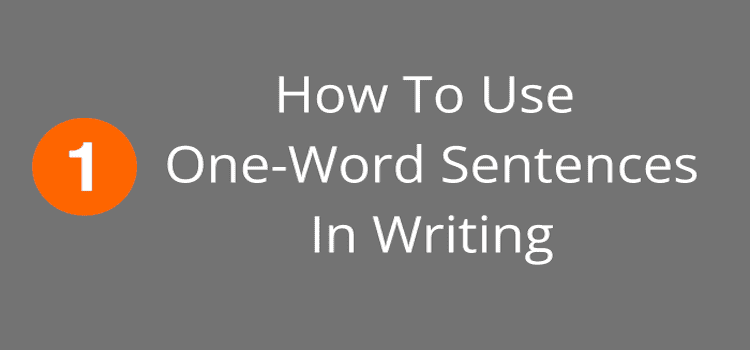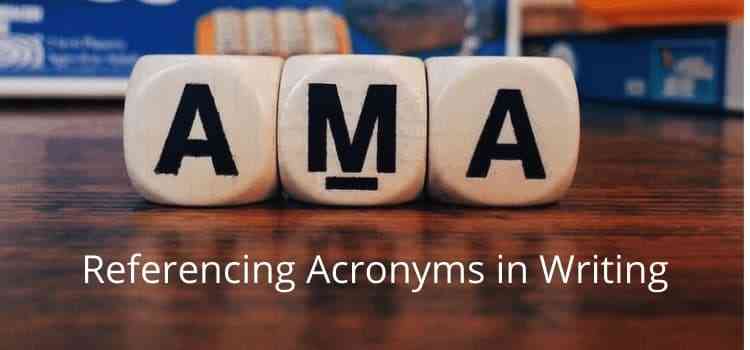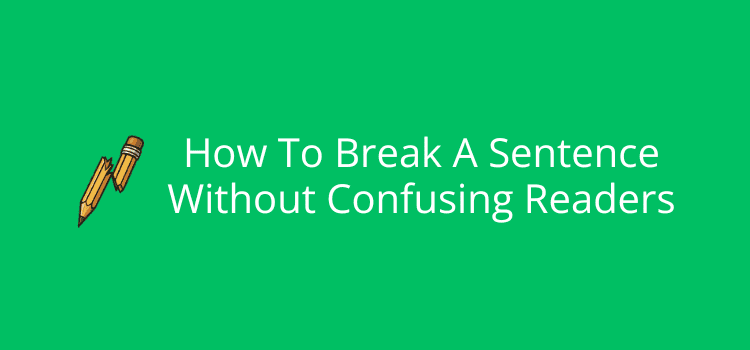
Can you use one-word sentences in writing? Definitely.
You will often see sentences consisting of only one word in all types and styles of writing. The brevity and impact can help in making a point or adding emphasis. When you read fiction, you will likely come across them quite often.
A sentence of one word is grammatically correct. It starts with a capital letter and ends with a period (full stop). But it can be off-putting for a reader if they occur too frequently.
However, when the need arises, using only one word can sometimes be a helpful tool for a writer.
Types of one-word sentences
You might sometimes read that these sentences are called imperative sentences.
But that’s not entirely true because it is only one of many uses. You can have different types, as with all sentences. Here are some of the common forms, with examples.
Interrogative – What, where, why, how.
Locative – Here, there, somewhere, nowhere.
Nominatives – Peter, Jane, Robert, Mary.
Imperative – Stop, run, jump, hide.
Adjectives – Amazing, Brilliant, Fantastic, Nice.
Adverbs – Barely, easily, happily.
Accusative – You, me, us, them.
Exclamations – Oh, yes, no, maybe.
Examples in literature
Almost any book you read will use sentences of only one word at least a few times, if not more.
You see it in dialogue a lot because one-word answers like yes, no, or perhaps are common.
But the best uses are more often to be found in the narrative.
Here are a few quotes I selected to show you how effective a one-word sentence can be.
Out came the bandanna. Honk. Peek. Out of sight. – The Shining – Stephen King
TRUE! — nervous — very, very dreadfully nervous I had been and am; but why will you say that I am mad? – The Tell-Tale Heart – Edgar Allan Poe
No one has said anything to his face at all. No one. Ever. – Dirk Gently’s Holistic Detective Agency – Douglas Adams
London. Michaelmas Term lately over, and the Lord Chancellor sitting in Lincoln’s Inn Hall. – Bleak House – Charles Dickens
Himself. And a chauffeur in livery. -The Sun Also Rises – Ernest Hemingway.
…mud flat and diamond mine, clavicord and dead drum. whatever. – To Women – Richard F Hugo
The last example uses a poetic variation by not capitalizing the word’s first letter.
From these few instances, you can see how the placement varies to help add impact or effect.
In Bleak House, Dickens uses London as a one-word sentence to set the location.
If you take notice, I’m sure you can find many more examples like these in novels and poetry.
Deciding on one word
Of course, there are no rules to apply here. Deciding when a single word is better than a longer sentence is up to you.
The reason I chose to write about this topic is because I agonized for over half an hour about a handful of words in an article I wrote recently.
Here’s where I started and where I finished.
Don’t rely on your assumptions. You should ask questions.
Never rely on your assumptions. Always ask questions.
Don’t rely on your assumptions. Ask questions.
Don’t rely on your assumptions. Ask.
In the end, I went with the one-word imperative because the sentence before is imperative, so they are parallel in structure.
But that’s not to say another writer would make the same choice.
There’s only one person who can decide. You.
Uses for single-word sentences
You can often use just one word to create a specific effect in your writing.
Here are some possibilities.
Emphasis: The meal at the restaurant was terrible. Awful. Disgusting.
Brevity: Exercise? Never!
Immediacy: “Don’t look back!” Run!”
Drama: The courtroom was hushed, waiting for the jury to announce its verdict; the accused, with head bowed. It arrived in almost a whisper. “Guilty”.
Surprise: My favorite time to write? Tomorrow.
Location: Paris. It waits for me every summer.
In dialogue, it’s very common to use one-word responses.
It would seem unnatural to answer closed questions with a long, wordy reply to one like this.
“Are you worried about what he might do if he finds us here?”
The natural response would be yes, no, or maybe. Anything longer would be repetitive.
“No, I’m not worried about what he might do.”
Short, even one-word responses in dialogue are expected and normal. But you should use them as sparingly as possible.
Summary
A sentence with only one word has many uses. But you need a good reason to use them.
Yes, it’s a quick way to say something, but that something should be meaningful.
The best way to decide is to consider what it is doing. Do you want it to surprise your reader?
Do you want to use it to create an element of suspense or intrigue? Or do you want to add a degree of emphasis to highlight a point?
If you think it works, then use it. But sometimes, if not frequently, it won’t.
When you read poetry or fiction, notice how great writers use them. Look at what they are saying with only one word.
For me, I’m always a little hesitant about using one-word sentences, perhaps because I don’t consider myself a great writer.
But there are times when I try to break the shackles and dare to be bold. Sometimes.
Related Reading: Learn From Writers – The Easy Way To Improve Your Writing
Share This Article


